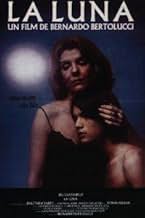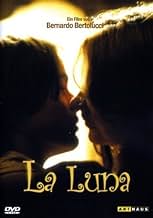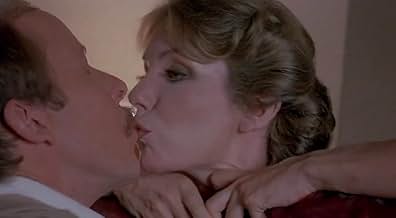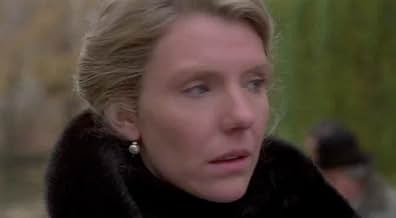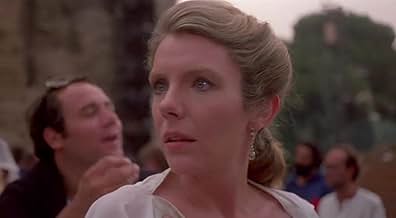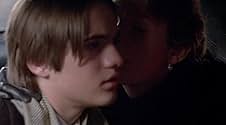Durante una gira por Italia, una cantante de ópera estadounidense que acaba de enviudar mantiene una relación incestuosa con su hijo de 15 años para ayudarlo a superar su adicción a la heroí... Leer todoDurante una gira por Italia, una cantante de ópera estadounidense que acaba de enviudar mantiene una relación incestuosa con su hijo de 15 años para ayudarlo a superar su adicción a la heroína.Durante una gira por Italia, una cantante de ópera estadounidense que acaba de enviudar mantiene una relación incestuosa con su hijo de 15 años para ayudarlo a superar su adicción a la heroína.
- Dirección
- Guionistas
- Elenco
- Premios
- 1 premio ganado y 2 nominaciones en total
Mustapha Barat
- Mustafa
- (as Stéphane Barat)
Sara Di Nepi
- Concetta
- (as Shara Di Nepi)
Jole Silvani
- Wardrobe Mistress
- (as Iole Silvani)
Opiniones destacadas
In a way I feel sorry for Bernardo Bertolucci's La Luna, though maybe more for Bertolucci than the film itself. Having come off of the monumental undertaking of 1900, he probably wanted to still keep the challenging creative juices flowing, and in doing so concocted an idea surrounding a mother and son who lose their closest significant other and go to Rome, only to get dragged into their own created mire of drug addiction, self-absorption, and incest. This, of course, sounds quite meaty dramatically, at least when first heard. Executed on film it's another story, and the final script is probably what ends up making the film one of the weakest- if not THE weakest- I've seen from the director yet.
This still means that there's good chunks in there, even really wonderfully sordid moments of incredible familial dysfunction between mother and son. But unlike, for example, Malle's Murmur of the Heart, there's a lack of cohesion to any sense of firm psychology with either mother or son, and while things are fascinating and potent in dramatic spontaneity in the first two-thirds, there's a moment when things start to go downhill. By the end, I wondered if Bertolucci was about to break into the end of 8 1/2.
We're given a character study, that's for sure, and quite the two f***ed up characters. The mother is Caterina (Jill Clayburgh, a quasi Diane Keaton look-alike, however only sometimes talented and convincing), who's husband (in a great bit part by Fred Gwynne) dies suddenly while driving a car. Though both mother and son are devastated, they go to Rome so she can sing in the opera there. The son, meanwhile, is at that absolutely abhorrent age in anyone's life- 15- and at first is into some nothingness abound with a girl, and soon enough into a dead-end mind-set of heroin.
This alarms her mother, to be sure, and perhaps the most perfect scene of the film (whether this means it will shock or unsettle is another matter), is when the son plays piano for a moment when the mother tries to get her son to tell her about his drug problem, peers for a moment under his shirt, and then he erupts at her with physical violence. Finally it ends, and she goes to one side of the room with a look like 'what the hell just happened', and he goes off to do more junk. There's even the brilliant little insinuation, which is all that's needed, of a notion of desire when she's trying to peer at his arm.
Now, if there had been more scenes like this, consistently, it might even be one of Bertolucci's masterpieces. But, however, this is not to be. Towards the middle things even become shaky, as the same randomness of mind and spirit with the mother and son, this chronic sense of equal parts of nihilism, despair, gallows humor, and the oddness of bourgeois discontent with dark pasts, becomes something that Bertolucci isn't fully able to grab a hold of. And unlike in Last Tango in Paris, there's no Marlon Brando here to make things incredibly appealing with totally believable dread in the face of loss. Matthew Barry is decent in the part of Joe, the son, but also teeters on being annoying (which maybe is part of the desired effect, but still).
And the sense of how their push and pull relationship with his drug addiction as the center isn't fully resolved with the mother. Clayburgh's Caterina just isn't sympathetic, or empathetic, enough to get into her mind-set, because despite being interesting in her part of a somewhat un-fit parent who loves her son perhaps in the worst possible ways, and that both are crazy, it isn't enough to sustain what happens at the 2/3 mark...which is when Bertolucci and his writers pull out the "son, I'll take you back to your roots, and find your *real* father who made you a bastard" card, and everything goes downhill from there.
It's a mark of downhill quality that has almost been building, and it's troubling especially since a lot DOES work in morbid detail of the characters, and how operatic intonations somehow become involved in their plights. But Bertolucci tends to put the hammer down in both technique and substance, and only in the former does it really work. His and Vittorio Storaro's eye in this film is just as sharp and succulent as in their other collaborations, with the camera gliding seamlessly in some crucial ways, providing movement to just the slightest moments of emotional upheaval. Yet even in the least effective spot of the film, there are the moments, like when Joe plays drums with his fork and spoon at the table. Or the very awkward silence after the mother's sexual advances go very unheeded. In the end La Luna becomes more worthwhile to see for what doesn't work as opposed to what does.
While some might come away from it feeling that it's an uncompromising work of genius, I wouldn't, though it's not a failure either. It's a curious work of bravura testing of the limits of what people- in this case Americans- can be in such a European environment, and that the psychologies therein are as wobbly as a bad table leg.
This still means that there's good chunks in there, even really wonderfully sordid moments of incredible familial dysfunction between mother and son. But unlike, for example, Malle's Murmur of the Heart, there's a lack of cohesion to any sense of firm psychology with either mother or son, and while things are fascinating and potent in dramatic spontaneity in the first two-thirds, there's a moment when things start to go downhill. By the end, I wondered if Bertolucci was about to break into the end of 8 1/2.
We're given a character study, that's for sure, and quite the two f***ed up characters. The mother is Caterina (Jill Clayburgh, a quasi Diane Keaton look-alike, however only sometimes talented and convincing), who's husband (in a great bit part by Fred Gwynne) dies suddenly while driving a car. Though both mother and son are devastated, they go to Rome so she can sing in the opera there. The son, meanwhile, is at that absolutely abhorrent age in anyone's life- 15- and at first is into some nothingness abound with a girl, and soon enough into a dead-end mind-set of heroin.
This alarms her mother, to be sure, and perhaps the most perfect scene of the film (whether this means it will shock or unsettle is another matter), is when the son plays piano for a moment when the mother tries to get her son to tell her about his drug problem, peers for a moment under his shirt, and then he erupts at her with physical violence. Finally it ends, and she goes to one side of the room with a look like 'what the hell just happened', and he goes off to do more junk. There's even the brilliant little insinuation, which is all that's needed, of a notion of desire when she's trying to peer at his arm.
Now, if there had been more scenes like this, consistently, it might even be one of Bertolucci's masterpieces. But, however, this is not to be. Towards the middle things even become shaky, as the same randomness of mind and spirit with the mother and son, this chronic sense of equal parts of nihilism, despair, gallows humor, and the oddness of bourgeois discontent with dark pasts, becomes something that Bertolucci isn't fully able to grab a hold of. And unlike in Last Tango in Paris, there's no Marlon Brando here to make things incredibly appealing with totally believable dread in the face of loss. Matthew Barry is decent in the part of Joe, the son, but also teeters on being annoying (which maybe is part of the desired effect, but still).
And the sense of how their push and pull relationship with his drug addiction as the center isn't fully resolved with the mother. Clayburgh's Caterina just isn't sympathetic, or empathetic, enough to get into her mind-set, because despite being interesting in her part of a somewhat un-fit parent who loves her son perhaps in the worst possible ways, and that both are crazy, it isn't enough to sustain what happens at the 2/3 mark...which is when Bertolucci and his writers pull out the "son, I'll take you back to your roots, and find your *real* father who made you a bastard" card, and everything goes downhill from there.
It's a mark of downhill quality that has almost been building, and it's troubling especially since a lot DOES work in morbid detail of the characters, and how operatic intonations somehow become involved in their plights. But Bertolucci tends to put the hammer down in both technique and substance, and only in the former does it really work. His and Vittorio Storaro's eye in this film is just as sharp and succulent as in their other collaborations, with the camera gliding seamlessly in some crucial ways, providing movement to just the slightest moments of emotional upheaval. Yet even in the least effective spot of the film, there are the moments, like when Joe plays drums with his fork and spoon at the table. Or the very awkward silence after the mother's sexual advances go very unheeded. In the end La Luna becomes more worthwhile to see for what doesn't work as opposed to what does.
While some might come away from it feeling that it's an uncompromising work of genius, I wouldn't, though it's not a failure either. It's a curious work of bravura testing of the limits of what people- in this case Americans- can be in such a European environment, and that the psychologies therein are as wobbly as a bad table leg.
Well well well, what do we have here? Another one of Bertolucci's earlier films? Yes and No. This is one of Bernardo Bertolucci's earlier films (1979), but it is unlike anything that he had done before or ever did again.
La Luna is something that is a gem of film-making history, even though it is virtually impossible to get on video (and it will most probably never be shown on Television again).
It tells the sad, depressing (yet beautiful) tale of a young boy's growth into adolescence , while experimenting with drugs and eventually (as they always do) ends up becoming addicted to Heroin.
His Mother(played ever so beautifully by Jill Clayburge), in an effort to try and 'wean him' off the drugs develops an incestuous relationship with her son.
Shocking as the description above may sound at first, please do not let it put you off seeing this fantastic film, as it is only a small slice of the cinematically glorious outing that this film is!
The photography portrayed in this film is the best that bertolucci has ever achieved (Yes, even the fantastic The Last Emperor and Little Buddah). When I say a film is utterly breath-taking (I am a hard person to please when it comes to films, just read my other reviews here!), then you know you're in for a treat and a half.
But, what is the point of this review unless people have a chance to witness the sheer beauty for themselves?
I saw this film when I was 15 years of age. I am now 26 and have never forgotten a single FRAME of La Luna. Every word, every scene sticks in my mind like a vivid memory, and I in some ways feel that I was in the film somehow and was able to feel all the anger, all the pain and all the love that surrounded it.
For a film to make this much of an impression on someone and for that impression to still be fresh in the person's mind eleven years later, you also know this film has to be a good thing.
You people, I am very sad to say, will probably never have the chance to see this film (as it has not been released on Video - I have tried nearly every day for eleven years to find a copy!!!).
But let what I have said stick in your mind, just as La Luna hopefully will some day...
La Luna is something that is a gem of film-making history, even though it is virtually impossible to get on video (and it will most probably never be shown on Television again).
It tells the sad, depressing (yet beautiful) tale of a young boy's growth into adolescence , while experimenting with drugs and eventually (as they always do) ends up becoming addicted to Heroin.
His Mother(played ever so beautifully by Jill Clayburge), in an effort to try and 'wean him' off the drugs develops an incestuous relationship with her son.
Shocking as the description above may sound at first, please do not let it put you off seeing this fantastic film, as it is only a small slice of the cinematically glorious outing that this film is!
The photography portrayed in this film is the best that bertolucci has ever achieved (Yes, even the fantastic The Last Emperor and Little Buddah). When I say a film is utterly breath-taking (I am a hard person to please when it comes to films, just read my other reviews here!), then you know you're in for a treat and a half.
But, what is the point of this review unless people have a chance to witness the sheer beauty for themselves?
I saw this film when I was 15 years of age. I am now 26 and have never forgotten a single FRAME of La Luna. Every word, every scene sticks in my mind like a vivid memory, and I in some ways feel that I was in the film somehow and was able to feel all the anger, all the pain and all the love that surrounded it.
For a film to make this much of an impression on someone and for that impression to still be fresh in the person's mind eleven years later, you also know this film has to be a good thing.
You people, I am very sad to say, will probably never have the chance to see this film (as it has not been released on Video - I have tried nearly every day for eleven years to find a copy!!!).
But let what I have said stick in your mind, just as La Luna hopefully will some day...
I actually auditioned for the role of the son when the mother was originally supposed to be played by Liv Ullman I think I read for it twice but was ultimately rejected because I looked too American in a Tom Sawyer kind of way-the boy who ended up doing it had a European quality in his face which Bertolucci wanted for the role. I saw it twice when it came out in the US, both times at the Loews Twin Cinemas. I remember it as having been gorgeously shot. The performances by Clayburgh and Barry are extremely good. Alida Valli is superb. The opera scenes were fantastic. Why isn't this out on DVD? Will we have to wait until after Bertolucci's death?
Not quite sure how I exactly feel about this film. As with a lot of Bertolucci movies, there are plenty of cringe-inducing moments, from the overblown Verdi opera scenes to Jill Clayburgh campily dancing around to rock music screeching "Oh yeah! In the 60s we believed in THINGS!!!" Taken as a whole, the movie is very uneven, psychologically muddled, heavy-handed and overlong. But there are haunting stretches in this movie which continue to resonate with me -- an opening passage where Clayburgh is biking in the night with her baby, and even smaller moments like the strangely beautiful shot of the teenagers skateboarding down the streets of Rome, or the kid dancing to "Night Fever". I would love to rewatch it and hope it get released on DVD. It's a fascinating entry in Bertolucci's work. A mess, but I think it's stayed with me more strongly than 1900 or Tango, though I think The Conformist still reigns supreme.
This is one of Bertolucci's best films. After the sudden death of his stepfather, whom he believes was his real father, the teenager Joe and his famous mother (played by Jill Clayburgh) depart for Italy. There, the unresolved enigma of his real father, his erotic attachment to his mother, the narcissism of the mother, and his own inability to truly connect with anybody else drive Joe into the world of heroin. His mother discovers his habit, and out of a combination of guilt and her own narcissistic loss of boundaries, first colludes with him to procure the drug, and then attempts to soothe him in his despair through sexual stimulation, and gets drawn into the Oedipal vortex into which Joe has plunged. This film demonstrates with great power the devastating consequences of the failure to resolve the Oedipal conflict. The film is difficult to find in America, but is well worth the effort.
¿Sabías que…?
- TriviaThe Italian producers were so outraged by this film's story line that they forbid the director to shoot the film with a local cast and as such the roles played by Jill Clayburgh and Matthew Barry had to be changed to be Americans.
- Citas
Joe Silveri: Your face is a mess. I'll clean it up.
[starts licking her face]
Caterina Silveri: It's good.
Joe Silveri: Hold still.
- Versiones alternativasAfter being banned in the Canadian province of Ontario. 20th century fox agreed to make cuts to 7 scenes showing incest and the film was given a 'Restricted' rating.
- Bandas sonorasNight Fever
Composed by Barry Gibb, Robin Gibb and Maurice Gibb
Performed by The Bee Gees
Courtesy of RSO Records Inc.
Selecciones populares
Inicia sesión para calificar y agrega a la lista de videos para obtener recomendaciones personalizadas
- How long is Luna?Con tecnología de Alexa
Detalles
Contribuir a esta página
Sugiere una edición o agrega el contenido que falta

Principales brechas de datos
What was the official certification given to La luna (1979) in Brazil?
Responda

